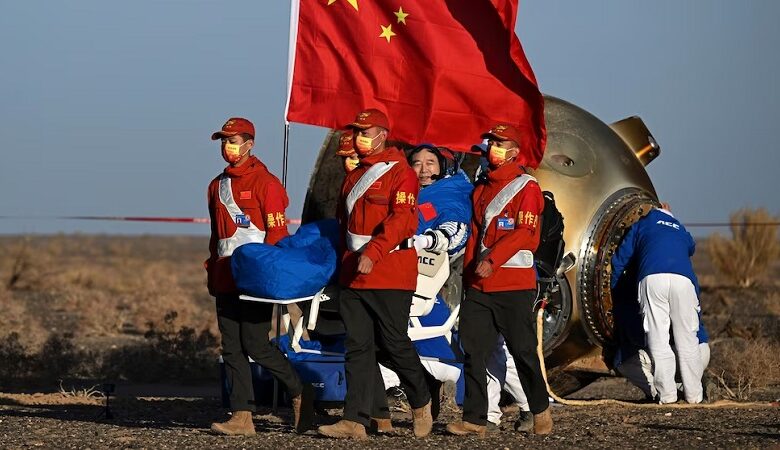Chinese Astronauts Return from Six-Month Stay Aboard China’s Orbiting Space Station

By Agnibeena Ghosh
In a remarkable space mission, three Chinese astronauts have safely returned to Earth after spending six months aboard China’s orbiting space station. Jing Haipeng, Zhu Yangzhu, and Gui Haichao emerged in good health from their return capsule, which touched down near the Jiuquan Satellite Launch Center on the fringes of the vast Gobi Desert. This achievement marks a significant milestone in China’s ambitious space exploration program.
The official Xinhua News Agency reported their successful return, underscoring the accomplishment of the crew and the technical precision of the mission. These astronauts played a pivotal role in the ongoing development of China’s space station, Tiangong.
The station, which is now considered essentially complete, serves as a symbol of China’s growing capabilities in space exploration. With the safe return of Jing Haipeng, Zhu Yangzhu, and Gui Haichao, the station’s new three-person crew arrived shortly before their departure, ready to take over and continue the important work that lies ahead.
This new team will be responsible for conducting a wide range of tasks. Among them are medical and scientific experiments, as well as the crucial maintenance of equipment aboard the station. These activities are essential to ensure the smooth operation and longevity of the station, contributing to our understanding of long-term human presence in space.
China’s journey into space exploration began with its first crewed space mission in 2003. Since then, the country has made significant strides in its space program, including landing a rover on the less-explored far side of the moon and bringing back samples from the lunar surface. One of its most ambitious goals is to place astronauts on the moon before 2030. This vision aligns with China’s broader plan to establish a formidable presence beyond Earth’s orbit.
In line with these aspirations, China is also planning to send a new telescope into space. This telescope will be designed to probe deep into the universe, enabling groundbreaking discoveries and enhancing our understanding of the cosmos.
China’s achievements in space exploration are not without their unique challenges and international dynamics. One of the significant factors influencing China’s space endeavors is its exclusion from the International Space Station (ISS). This exclusion is primarily attributed to concerns raised by the United States regarding Chinese military involvement in the nation’s space program.
The diplomatic and geopolitical intricacies of this exclusion have led Beijing to chart its path in space exploration. As a result, China embarked on the construction of its space station, Tiangong. This self-reliant approach allowed China to assert its presence and independence in the realm of space exploration, free from the restrictions placed on international collaboration.
In recent years, China has emerged as a principal competitor with the United States in the race to achieve new milestones in outer space. The two superpowers have had extremely limited cooperation in space exploration, a situation mandated by U.S. law. This divergence in their space ambitions reflects the broader competition for influence that exists between the world’s two largest economies in various domains, including technology, trade, military capabilities, and diplomacy.
The United States, for its part, is also engaged in a renewed commitment to crewed space missions. Plans are in place to return astronauts to the lunar surface by the end of 2025. This endeavor is part of a broader vision for lunar exploration, where private sector entities such as SpaceX and Blue Origin are playing significant roles in advancing space capabilities.
News Mania Desk / Agnibeena Ghosh 1st November 2023






